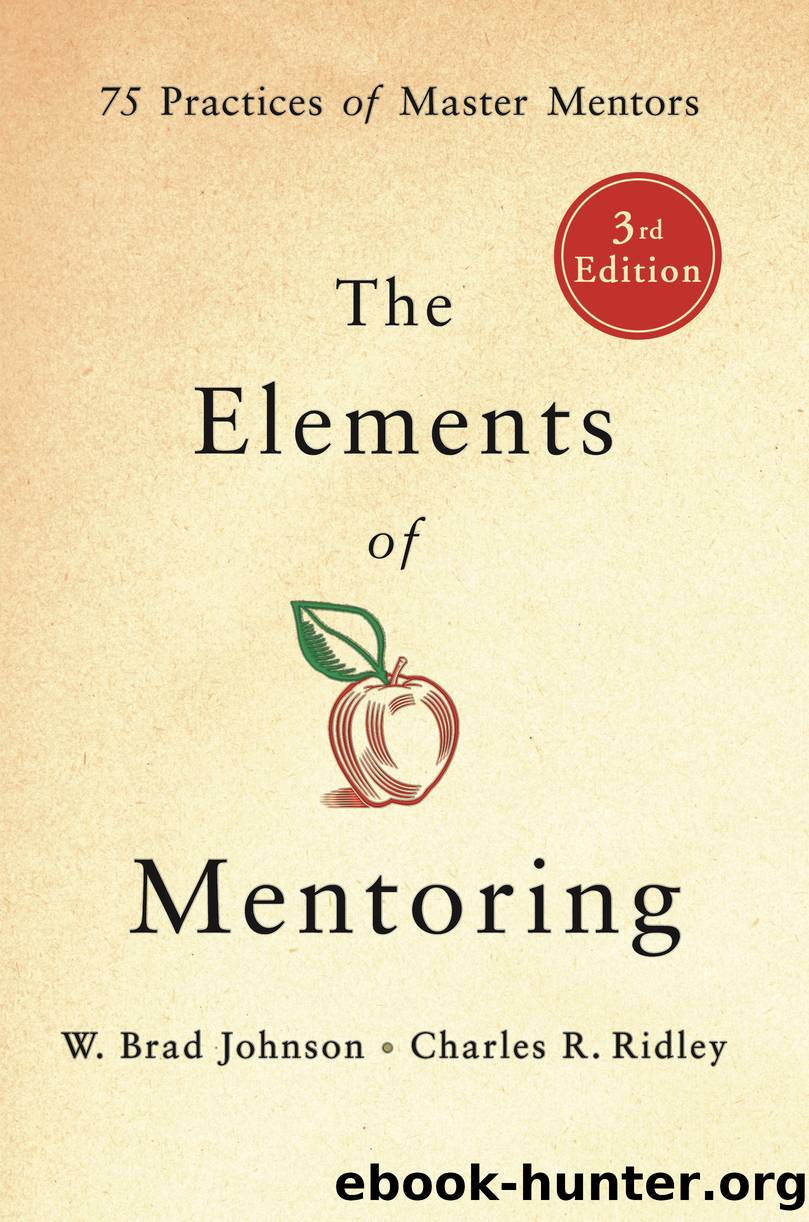The Elements of Mentoring by W. Brad Johnson

Author:W. Brad Johnson
Language: eng
Format: epub
Publisher: St. Martin's Publishing Group
42
Describe Potential Benefits and Risks
A famous author and popular professor, Oscar had been nominated for the Pulitzer Prize for his writings on economics. Paradoxically, he also was considered a âthornâ in the universityâs side. His revolutionary ideas and bombastic style often caused him to be reviled and rejected by colleagues and administrators. Oscar occasionally agreed to mentor a younger âstarâ in his subspeciality of economics, but whenever he did, he was careful to offer what he called âinformed consent.â He warned faculty that association with him might âmake your career, sink your career, or both!â Oscar elaborated that although he was successful in helping new professors get grants and gain international recognition, association with him also resulted in his menteesâ receiving occasional jibes and rejections from colleagues Oscar had alienated. He felt that prospective mentees should understand the assets as well as potential liabilities in committing to a mentorship with him.
Inherent in all mentorships are potential risks and benefits. Some of these consequences are not always apparent. Therefore, as much as possible, mentors should inform mentees about the primary risks and benefits associated with mentoring. In the majority of cases, mentorship outcomes are almost always positive from the menteeâs perspective. Salient benefits include more rapid professional development, greater satisfaction with training and oneâs career, faster promotion rates, larger salaries and total compensation packages, accelerated career mobility, and a stronger sense of competence and confidence in oneâs job. In short, mentees have more opportunities, are better compensated, and feel more prepared to succeed in their field. Because of these benefits, some professionals believe that identification with a mentor should be considered a major developmental task in oneâs early career.
Although the benefits usually outweigh the risks in mentor relationships, some risks do exist. Animosity or professional jealousy on the part of peers is a salient risk. The infamous âblack haloâ effect is another. Here the menteeâs career is adversely affected when a mentor falls out of favor in the organization. Then there are the mentorships that turn sour. Here one or both parties feel disenchanted, disappointed, or emotionally wounded, which may occur for a variety of reasons, such as unmet expectations, feelings of abandonment, or jealousy.
Mentors can take a couple of steps to help mentees in this area. First, they can discuss potential risks early in the relationship or even before the mentee commits to the mentorship. This shows respect by giving the mentee an informed choice. An informed mentee may decide that the potential risks are not worth the commitment. On the other hand, an informed mentee is better prepared to help prevent any negative outcomes or handle them if they occur.
Second, mentors can be open and honest about benefits and risks they stand to incur in the relationship. Mentors benefit by increasing their productivity, gaining recognition for their mentoring abilities, and experiencing satisfaction associated with seeing a talented junior professional thrive. Mentoring is often a good way to create a network of good colleagues and friends. Mentors may enjoy years of ongoing collaboration with mentees.
Download
This site does not store any files on its server. We only index and link to content provided by other sites. Please contact the content providers to delete copyright contents if any and email us, we'll remove relevant links or contents immediately.
The Bullet Journal Method by Ryder Carroll(1499)
Doesn't Hurt to Ask by Trey Gowdy(1398)
The Concise Laws of Human Nature by Robert Greene(1219)
The 7 Habits of Highly Effective People by Stephen R. Covey & Sean Covey(1012)
HBR's 10 Must Reads 2021 by unknow(975)
Hook Point: How to Stand Out in a 3-Second World by Brendan Kane(929)
HBR's 10 Must Reads 2021 by Harvard Business Review(876)
The Job Closer by Steve Dalton(816)
Master of One by Jordan Raynor(809)
Don't Sweat the Small Stuff...and It's All Small Stuff by Richard Carlson(807)
100 Things Successful People Do by Nigel Cumberland(799)
Primal Leadership by Daniel Goleman(777)
Amazon Unbound by Brad Stone(777)
Declutter Your Mind: A step by step guide to learn to control your thoughts, stop worrying, relieve anxiety and eliminate panic attacks and negative thinking by Mia Chandler(746)
Lives of the Stoics by Ryan Holiday & Stephen Hanselman(719)
Coders at Work: Reflections on the craft of programming by Peter Seibel(659)
The Power of 100! by Shaun King(643)
Conflicted by Ian Leslie(642)
The Mechanism of Mind by Edward De Bono(639)
